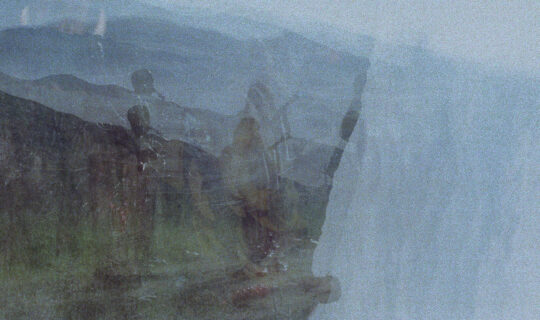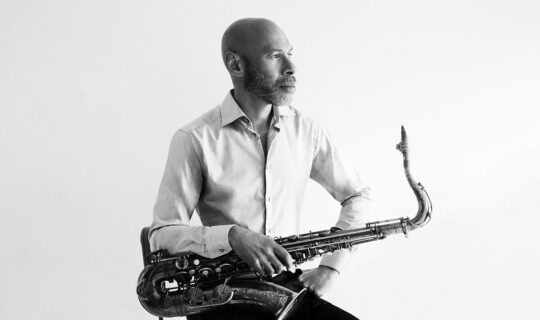February 5, 2013
After 43 years, saxophonist Wayne Shorter has returned to the Blue Note roster. And his first album for the label since 1970’s Odyssey of Iska is the third in a series of live albums documenting his long-running quartet. Shorter began performing with pianist Danilo Perez, bassist John Patitucci, and drummer Brian Blade at the turn of the millennium, and the group has been touring the world since, performing sets that are equal parts standards, new compositions, and deeply introspective improvisation. The quartet has released two previous documents of their onstage explorations—2002’s Footprints Live! and 2005’s Beyond the Sound Barrier, as well as the studio album Alegría, which featured guest musicians alongside the core band. But Without a Net is unique; the album’s centerpiece is the 23-minute “Pegasus,” recorded with the five-piece Imani Winds Ensemble. We spoke to drummer Brian Blade about his 12-year tenure with the group, interpreting Shorter’s compositions, and more.
How were you initially recruited into this band?
Well, I’m not sure exactly. Wayne has his ear to the ground, so to speak, I think he’s aware of musicians and listening, but I’m not sure if it was the connection of me having played with Joni Mitchell, and his long-term recording and personal relationship with her, but either way, I got a call from him. I was in L.A. back in the late ’90s with Joshua Redman and Christian McBride, playing at Catalina Bar and Grill, and he wanted to have some rehearsals at his house; he called me over and we got to know each other a little bit. And some years went by before he reached out again and was starting to do some recording, which became Alegría, with Danilo and John Patitucci, who’d known Wayne longer than Danilo or myself—he’d played with him back in the Phantom Navigator days.
This is the group’s third live album—does Wayne just not feel like going in the studio anymore?
I suppose he doesn’t. [laughs] We play so many shows, and the way things progress in the living moment—not that that doesn’t happen in the studio, but I guess he perhaps has kind of brought us into his vision, and the way we’ve come to this collective compositional process, perhaps it’s just been his preference, rather than going into the studio.
He’s constantly writing, though, right? How often does he bring in new compositions, and what form do they take—are they sketches to fuel improvisation, or complete works?
Yeah, he’s constantly composing, and when he brings something to us, it’s fully realized. It’s all very much composed, or de-composed, as he would say. ’Cause really, our part is the de-composing, he says. But it comes so perfect, and to my mind, we could play it from the beginning to the end and I’d be fine with that. But he wants us to almost extract cells from it, to find windows, to come to the unknown together. But we as a trio—me, Danilo and John—try to be true to what he’s written, because obviously he’s dedicated a lot of time and passion into that writing and we don’t want to discard all that genius. So it’s interesting, that balance, for the rhythm section to try to honor his gift as a composer and an improviser and find that median between that and his vision of what the quartet is, off the page. It’s quite a fragile balance, so we’re always walking that line.
What was the performance with Imani Winds like for you as a member of the band?
You know, Wayne, like I said, is always composing, for larger ensembles, for chamber ensembles like the Imani Winds quintet or different, larger groupings, and I think they commissioned Wayne to write a piece for them which I believe was called “Terra Incognita,” and with that commission I think he also invited them into a few pieces he had written that would include them with the quartet. It was great to feel that, and to stick somewhat closely to a script, though there’s so much improvisational or group-compositional room in everything he writes or envisions. It was great to hear that combining of the Imani Winds and the way they interpret rhythm and his melodies, for it all to become one organism. Because it becomes more and more difficult, the larger an orchestral group it is, the harder it is to really feel completely tied and connected rhythmically and harmonically. They understand the rhythmic flow of the quartet and Wayne’s ideas, so it was a fun series of concerts we did with them.
Are there other pieces you guys have recorded that you’d like to see released?
Man. All the concerts we’ve played in the last 12 years, and Rob Griffin, the engineer who travels with us, he records almost everything—so it all starts to blur together in my memory, ’cause every night, there’s always something. If not the overall arc of the evening, a particular song or a particular interpretation of a piece we revisit often, like “She Moves Through the Fair” or “Flying Down to Rio” or “Plaza Real,” you know, how many versions are there? I don’t know. That’s the one difficult part of making a live recording—when you restrict yourself to just a period, like this tour in July of that year, as opposed to, we’ve got eight years since Beyond the Sound Barrier, of recordings of concerts that have piled up quickly. To listen to all that, to assess that truly, and come away with some objectivity, is difficult. I think Wayne chose a period to draw from, and I would defer to him in the choices he’s made to represent the quartet. If you ask me, we might as well just put out every concert and let people pick. [laughs] Listen to that evening, or this other night—it’s all Wayne, all the time.
When I saw the band play at Town Hall in 2011, you seemed to be the most amped-up guy onstage, really throwing bombs at the other guys. Is that typical?
[laughs] It changes from night to night, you know? Sometimes, like life, there’s an ebb and flow of energy and undulating movements. Sometimes I don’t feel like I have anything to say, but inevitably you look to your brothers across the stage—Wayne, or Danilo, or John—somebody’s gonna say something, and it’s gonna spark you to say, OK, what can I bring to the conversation? And then we’re in the movie, as Wayne might say at that point. The story’s being told. So how I react, what I feel like contributing in that moment, could be something very dense and intense, or it could be not playing that I feel is the thing that is most needed at that moment. I want to feel like, as much as he’s fed us, both long before I actually knew him, from recordings, and what he gives us onstage, with his voice through the horn and even in silence, I like to feel like I’m bringing something that will inspire him and Danilo and John. That’s the great thing about the quartet—everyone takes the gift that you bring and wraps it in a bow, and finds that thing to balance it or to lift it up even more, or find some counterpoint that creates a whole new composition. It’s a real testament to group trust and group effort, to tell a story.




